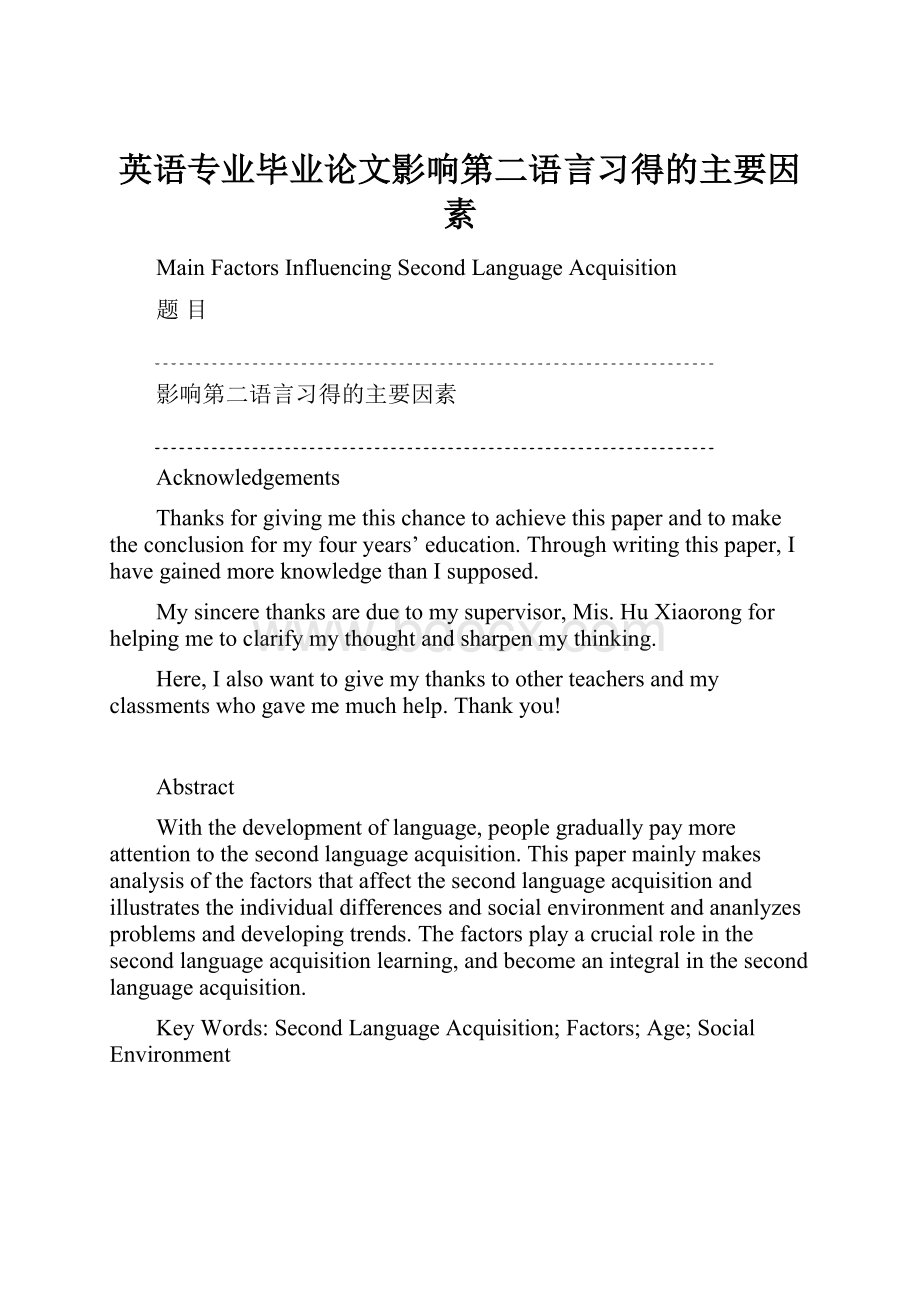英语专业毕业论文影响第二语言习得的主要因素.docx
《英语专业毕业论文影响第二语言习得的主要因素.docx》由会员分享,可在线阅读,更多相关《英语专业毕业论文影响第二语言习得的主要因素.docx(13页珍藏版)》请在冰豆网上搜索。

英语专业毕业论文影响第二语言习得的主要因素
MainFactorsInfluencingSecondLanguageAcquisition
题目
影响第二语言习得的主要因素
Acknowledgements
Thanksforgivingmethischancetoachievethispaperandtomaketheconclusionformyfouryears’education.Throughwritingthispaper,IhavegainedmoreknowledgethanIsupposed.
Mysincerethanksareduetomysupervisor,Mis.HuXiaorongforhelpingmetoclarifymythoughtandsharpenmythinking.
Here,Ialsowanttogivemythankstootherteachersandmyclassmentswhogavememuchhelp.Thankyou!
Abstract
Withthedevelopmentoflanguage,peoplegraduallypaymoreattentiontothesecondlanguageacquisition.Thispapermainlymakesanalysisofthefactorsthataffectthesecondlanguageacquisitionandillustratestheindividualdifferencesandsocialenvironmentandananlyzesproblemsanddevelopingtrends.Thefactorsplayacrucialroleinthesecondlanguageacquisitionlearning,andbecomeanintegralinthesecondlanguageacquisition.
KeyWords:
SecondLanguageAcquisition;Factors;Age;SocialEnvironment
摘要
随着语言的发展,第二语言的习得逐渐被人们所重视和研究。
本文在对影响第二语习得的因素的主要研究成果进行分析和比较之余,着重从学习者个体差异中的年龄和外在因素的社会环境两个方面进行分析。
浅要分析了其中的问题或发展趋势。
由于他们在第二语习得的学习中起着至关重要的作用,并已成为第二语习得模式不可或缺的一部分,因此本文的分析对第二语习得的学习有着实际的指导意义。
关键词:
二语习得;影响因素;年龄;社会环境
Contents
1.Introduction1
1.1BackgroundofSecondLanguageAcquisition1
1.2TheImportanceoftheStudySecondLanguageAcquisition2
2.TheMainFactorsontheSecondLanguageAcquisition2
2.1Age2
2.2SocialFactors5
2.2.1SeondLanguageProficiencyandParentalOccupation7
2.2.2SecondLanguageProficiencyandParentalEconomicStatus7
3.Conclusion10
Bibliography12
MainFactorsInfluencingSecondLanguageAcquisition
1.Introduction
Withthedevelopmentofglobalization,today’sinterculturalencountersarebecomingmoreandmoreabundantandsignificant.Wecannowgoanywhereintheworldnomatterofhours,andtherealityofaglobaleconomymakestoday’scontactsfarmorecommonplacethaninanyothertimeoftheworld’shistory.Butwhateverwedo,languageisatthecenteroftheencounter.Whenwedointerculturalcommunication,asecondorforeignlanguageisusuallynecessary.InChina,likeelsewhereintheworld,knowingantherlanguage,Englishinmostcases,maymean:
gettingadecentjob;achancetogetbettereducation;theabilitytotakeafullerpartoflifeortheopportunitytogoabroad;anexpansionofone’shorizonsinliterature,culture,scienceortechnology.Itaffectspeople’scareersandpossiblefutures.Indeed,whathedemandsistolearnEnglishthattherearenowfarmorestudentsofEnglishinChinathantherearenativespeakersofEnglishacrosstheworld.Englishlearningandteachingis,inshort,oneofChina’sgreatestgrowthindustries.TherearemanyresearchonSecondLanguageAcquisition.
1.1BackgroundofSecondLanguageAcquisition
ChinesestudentswholearnEnglishusuallyspend,fromprimaryschooltouniversity,morethantenyearslearningthelanguage.Suchalongtimeendeavordrasticallyaffectstheirexposuretoothercoursesinacademicfields,evenaffectingtheirall-rounddevelopment.Whatisworse,aftersuchalongtime,itishardtosaythatalotofstudentshaveacquiredtheEnglishskillseffectively,especiallythoseofliteningandspeaking."Consumingtoomuchwhileachievingsolittle”isatruepictureoflearningEnglishinmostareasofthecountry.Asstatisticsshow,72,6%ofcollegegraduatescannotspeakEnglishintheirdailyconversationafter8to10year’sstudyoflanguage.
Therearemanyfactorsaffectsecondlanguageacquisition,suchasone'smothertongue,culture,age,individualvariable,socialfactorandprovincialkeyinstitutionsofhighereducationandsoon.Hencemuchconcernfromtheeducationaladministrations,theschoolauthoritiesandEnglishlanguageteachers,linguistsandresearcheshasbeengiven.Itisarguedthatit'sbecauseofthelackofEnglishlearning.Thenegativeinfluenceofthetraditionaleducationsystemtendstoproduceexamination-orientedlearnerswhoareof“highgrades,butlowabilities”.Andduetothetraditionalteacher-centeredapproaches,thestudents,accustomedtobeingspoon-fed,areoftentreatedasthepassiverecipientsoflinguisticknowledge.Recentyears,however,therehasbeingthemostfundamentalchangeinL2acquisitionresearchers,whichhasbeenashiftfromconcernwiththeteacher,thetextbookandmethodtoaninterestinthelearnerandtheacquisitionprocesses,Asisknown,itisthelearnerswhoareinternalfactorsthatplaythemainroleinthelearningprocessratherthantheteacherswhoareexternalfactors.
1.2TheImportantoftheStudySecondLanguageAcquisition
Onthebasisofotherresearches,thispaperwilltrytouseanewandmoreprofessionalmethod,toanalysetheaffectinsecondlanguageacquisitionfromtwoaspects:
ageandsocialfactors.Inthefirstpart,thepaperexpressthebackgroundinformationandimportantofthestudyoftheresearch.Thenthepapermainlyanalysethefactorfromtwoaspects:
ageandsocialfactors.Inthispart,thepapertrytomakeadetailandspecificexplanationtothereason.
2.TheMainFactorontheSecondLanguageAcquisition
2.1Age
ThereareagooddealofcomprehensivereviewsoftheSLAliteraturedealingwithage.Atfirstsight,theSLageresultslookchaotic,somestudiesappearingtoshowchildsuperiority,somefavouringadults.Thereisaprevailingbeliefthatchildrenaregoodatthesecondlanguage(L2)learning.Itisbasedonmanypeople’sexperiencethatchildrenwhoimmigratetoaforeignenvironmentareabletolearnthelanguagemoreeasilyandquicklythantheirparents.Itseemsthatchildrencanachieveanative-likeleveleasily,whileadultsstudyhardanddiligentlyforyearsonlytofindthattheresultsareunsatisfactory.Itseemsthatchildrenareintrainsicallybetterlearners.Butthisassumptionhasnotbeenconfirmedbyallresearchersinthisfield.Onthecontrary,alotofevidencesprovethattheorlderchildrengrowthemoreeffectivelytheylearnandthatteenagersareprobablythebestlearners(Ellis,1994:
484-94).Theonlyexceptionmightbepronunciation,whichislearnedmoreeasilybyyoungerchildren.Buttherearestillsomeevidencestosupportthefactthatadultscanalsolearnnative-likepronunciation.Someresearchershavearguedfortheexistenceofa‘criticalperiod’inL2learning.Theydenythatalearnerwillhavemuchmoredifficultyinlearningaforeignlanguageifhe/shehaspassedtheoptimumperiod.Oyamastudied60Italianmaleimmigrantswhosearrivalageisbetween6and20,wholiveinAmericanabout5to18years.Theresearchindicatesthatthechildrenwhoseageisunder12immigrantintheUSAcanhavethesamelanguageabilityasthenativeAmerican.ThelengthofresidenceofimmigrantslearningEnglishinAmericanrelatedlesstotheSLA,buttheageofimmigrantshaveanimportantfactontheSLA.
Payne,Oyama,ectfoundthatitcanbeexplainedbythecriticalperiodhypothesis,thecriticalperodhypothesisshowsthatthereisaperiodhypothesis.Thecriticalperiodhypothesisstatesthatthereisaperiodwhenlanguageacquisitiontakesplacenaturalyandeffortlessly.PenfieldandRoberts(1959)arguedthattheperfectageforlanguageacquisitionisthefirsttenyearsoflife.Duringthistimethebrainretainsplastiity,butwiththeonsetofpubertythisplasticitybeginstodisappear.Theythinkthatthiswastheresultofthelateralizationofthelanguagefunctionofthelefthemisphereinthebrain.Theneurologicalcapacityofunderstandingandproducinglanguagethatprimarylyinvolvesbothhemispheresofthebrain,isslowlyconcentratedinthelefthemisphereformanypeople.Theincreaseddifficultywhicholderlearnerssupposedlyexperencewasseenasadirectresultofthisneurologicalchange.
AsecondgeneralizationmadebyKrashenetal.isthatolderchildrenacquiremorefasterthanyounger(agininarlystagesofmorphologicalandsynatacticdevelopmentwheretimeandexposureareheldconstant).Representativeresultsarethoseby(RosamnMitchellet,al:
1998,145-146).Ektrandstudied2,189eight-toseventeen-year-oldslearningSwedishasaSLoveratwo-yearperiod.Hefoundalinearimprovementwithage,andthatolderchildrenperformedbetterthanyoungerchildrenonmeasuresoflisteningcomprehension,reading,freewriting,pronunciationandspeaking.InananalogousESLstudy,Fathmanstudied200childrenagedeighttofifteen,livedintheUSAfromonetothreeyears,assessingtheirEnglishmorphology,syntaxandpronunciationusingtheSLOPE(apicture-cuedsentence-completiontest)andapicture-descriptiontask.Eleven-tofifteen-year-oldsoutperformedsixtoten-year-oldsonmorphologytheyoungergroupdidbetteronpronunciation.SimilarfindingsregardingthesuperiorityofolderlearnersonrulegovernedaspectsoflanguagearereportedbyErvin-Tripp(1974),chun(1978),SnowandHoefnagel-Hohle(1978),andHarley(1986).
AnnFathmanmadeastudyin1982toexaminetherelationshipbetweencertainaspectsofthesecondlanguageacquisitionprocessandagethroughonoralproductiontest.Thesubjectsforthisstudywere200children(aged6to15)fromdiverselanguagebackgroundswhowerelearningEnglishasasecondlanguageinpublicschools.Theresultsindicatedthatthereissomerelationshipbetweenageandratelearning.TheolderchildrenperformedbetterintheproductionofcorrectmorphologicalandsyntacticstructureswhereastheyoungerchildrenweresuperiorintheuseofcorrectEnglishpronunciation.
RateandsuccessofSLAappartobemainlyinfluencedbytheageofthelearner.Hererateisconcerned,thereisevidencetosuggestthatolder